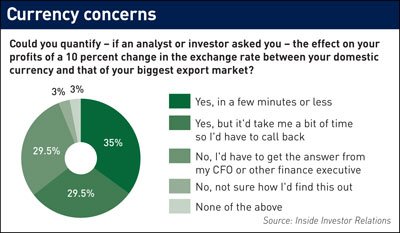How to tackle macroeconomic factors in your IR communications, as discussed at a recent IR Magazine Webinar
The event recording is now available here.
From political risk to currency volatility and inflation, macroeconomic factors have grabbed the attention of investors during this turbulent period for the global economy. Given this environment, IR magazine held a webinar in association with Bloomberg to examine the most effective ways to communicate with the investment community about macro issues, featuring an IRO, a fund manager and an economist.
A poll of audience members found they share the conviction that macro issues are becoming more important, with 84 percent saying stocks are driven today more by macro factors than they were in the past. But to what extent should you be out there explaining how macroeconomic factors affect your business? Some might say that job is better left to economists.
To illustrate this dilemma, Roddy Child-Villiers, head of IR at Nestlé, explained the mixed response he received for a presentation on macro issues he gave during a roadshow. ‘I set the scene with a fairly detailed trundle through a bunch of macro issues,’ he recounted. ‘And then I went on to talk about how we are going to manage those issues and how we were running the business in view of those issues.
‘In terms of the feedback, we got a lot of people saying, We are analysts, we are investors, we work in banks, we don’t need the company to tell us about macro issues. But then we got another bunch of people saying it was actually fantastic, it was good to hear Nestlé’s perspective on those macro issues.’
Despite the mixed response, Child-Villiers has not been deterred from discussing how top-down issues affect Nestlé. That’s because he doesn’t want Nestlé to be viewed as simply a macro play by investors, unable to control its own destiny. ‘Nestlé is a somewhat sizable company and we are clearly not going to be immune to macro issues for better or for worse,’ said Child-Villiers.
‘The danger is that we just become a proxy for the world economy, and that is absolutely not what we are about. We are about creating strategies that enable us to outperform.’
Greater proactivity
Daniel Lacalle, a senior portfolio manager at Ecofin, a London-based investment firm specializing in energy, agreed that the increasing importance of macroeconomic factors requires IROs to be more proactive. ‘As global information becomes more readily available more quickly, and the macro factors are more important, the companies that are able to extract value in difficult times are the ones that outperform, and those are the ones that investors need to pick,’ he said.
In the current environment, Lacalle said he is seeing the highest dispersion of returns among oil and gas stocks for the last 23 years. ‘Even among super majors – Exxon, Chevron, BP, Royal Dutch Shell, Total – there was an average dispersion of return of 17 percent [last year],’ he noted. ‘That is where stock picking comes in. You can generate tremendous performance regardless of the performance of the sector itself.’ 
Some regions are handling disclosure around macro factors better than others, added Lacalle. He said emerging market companies tend to be very forthcoming about how they stand in relation to the macro environment. But European companies often ‘shrug off the commodity and macro environment,’ he observed. ‘It’s very typical to hear management [say] this is not fundamental – [but] it is, it’s increasingly fundamental.’
Data points
The third panelist, Joseph Brusuelas, a senior economist at Bloomberg who contributes to the daily Bloomberg Brief newsletters, ran through a variety of data he thought it would be a good idea for IROs to look at each day as they monitor the macro environment.
He mentioned the US Financial Conditions Index (which is weighted one third on money markets, one third on bond markets and one third on equity markets), the global manufacturing picture, inflation rates, household debt and central bank interest rates, among other benchmarks.
From these different data points, Brusuelas explained to the webinar audience how they would affect investment decisions. For example, if interest rates stay low in the US while rising in other countries, this will boost demand among US investors for international equities, he said.
The webinar, part of a series of executive briefings on key topics for IR professionals, is available to listen to here.










